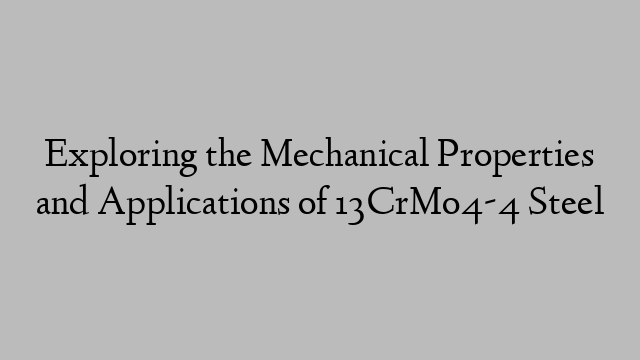Address
304 North Cardinal St.
Dorchester Center, MA 02124
Work Hours
Monday to Friday: 7AM - 7PM
Weekend: 10AM - 5PM
Address
304 North Cardinal St.
Dorchester Center, MA 02124
Work Hours
Monday to Friday: 7AM - 7PM
Weekend: 10AM - 5PM

Exploring the Mechanical Properties and Applications of 13CrMo4-4 Steel
1. Specification:
– Steel grade: 13CrMo4-4
– Standard: EN 10028-2
– Chemical composition: Carbon (C): ≤0.08%, Silicon (Si): ≤0.35%, Manganese (Mn): 0.40-1.00%, Phosphorus (P): ≤0.025%, Sulfur (S): ≤0.010%, Chromium (Cr): 0.70-1.15%, Molybdenum (Mo): 0.40-0.60%
– Mechanical properties: Tensile strength: 450-600 MPa, Yield strength: ≥295 MPa, Elongation: 17%, Notch impact energy: ≥40 J (Longitudinal), ≥30 J (Transverse)
2. Mechanical Properties:
– Tensile Strength: 13CrMo4-4 steel has a tensile strength ranging from 450 to 600 MPa, indicating its high strength. This makes it suitable for applications that require materials capable of withstanding high pressure and stress.
– Yield Strength: The minimum yield strength of 13CrMo4-4 steel is 295 MPa. It shows the point at which the material starts to deform plastically under tensile load. This property ensures the steel’s structural integrity and resistance against deformation.
– Elongation: 13CrMo4-4 steel offers an elongation of 17%. It signifies the ability of the material to stretch or elongate before breaking. This property is important for applications where flexibility and ductility are required.
– Notch Impact Energy: The minimum notch impact energy requirement for 13CrMo4-4 steel is 40 J (longitudinal) and 30 J (transverse). This property demonstrates the steel’s ability to resist fracture under sudden applied loads, making it suitable for applications subjected to dynamic or impact loads.
3. Chemical Composition:
– Carbon (C): Carbon content in 13CrMo4-4 steel is limited to ≤0.08%, ensuring it maintains good weldability and avoids carbon-induced brittleness.
– Silicon (Si): Silicon content is limited to ≤0.35%, which helps enhance the steel’s strength and hardness.
– Manganese (Mn): The addition of manganese in the range of 0.40-1.00% contributes to improving the steel’s toughness, hardenability, and strength.
– Phosphorus (P) and Sulfur (S): Phosphorus and sulfur are limited to ≤0.025% and ≤0.010% respectively. The low levels of these elements prevent the formation of internal defects, such as cracks and voids, and improve the steel’s weldability.
– Chromium (Cr): The presence of 0.70-1.15% chromium in 13CrMo4-4 steel provides excellent corrosion resistance and improves the material’s high-temperature strength and oxidation resistance.
– Molybdenum (Mo): The addition of 0.40-0.60% molybdenum enhances the steel’s creep resistance, resistance to hydrogen attack, and high-temperature strength.
4. Applications:
– 13CrMo4-4 steel is widely used in the manufacturing of power plant equipment, such as boilers and pressure vessels, operating at elevated temperatures and pressures.
– It is employed in heat exchangers, pipelines, and processing equipment in the petrochemical industry due to its excellent corrosion resistance and high-temperature strength.
– The steel is also used in the production of gas turbines, as it can withstand the high temperatures generated in these applications.
– Other applications include steam generators, superheaters, and reactor components in the nuclear industry.
Overall, 13CrMo4-4 steel exhibits excellent mechanical properties, making it suitable for various demanding applications in industries such as power generation, petrochemicals, and nuclear energy. Its combination of high strength, good weldability, and resistance to corrosion and high temperatures ensures its reliability and durability in harsh operating conditions.
13CrMo4 4 Steel grade
1698275601